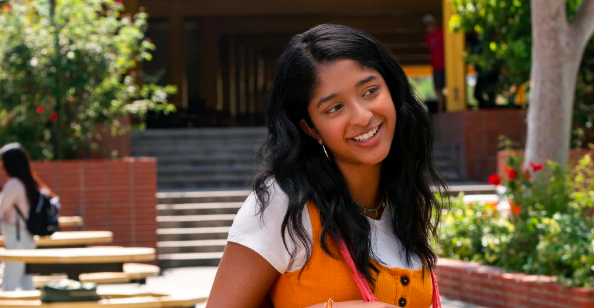The coming-of-age, American Netflix hit, Never Have I Ever, was more than just another trending series for brown girls everywhere.
Behind the typical setting of yet another high school themed Netflix series lies a deeper meaning of what it means to be represented.
Created by Mindy Kaling and Lang Fisher the 10-episode series does something no show has ever done before by putting the spotlight on a brown teenage girl, Devi Vishwakumar played by Maitreyi Ramakrishnan.
By magnifying the experience of an Indian teenager, the show explores the culture clash that comes with growing up in a predominantly white, western country as a child of first-generation immigrants.
Whilst our experiences weren’t exactly the same, as a 21-year-old Sri Lankan woman, having someone who looks like me as the lead of a Netflix series meant something.
I was no longer represented as the token friend of colour or just another girl in the background.
Growing up with brown skin in Australia, a predominantly white country, forced me to question my differences from a very young age.
Why isn’t my skin like the other kids in pre-school?
Why am I the only brown person on this beach?
Why don’t they stock my foundation shade at Woolies?
Why don’t people who look like me present the news?
I never felt like being brown was normalised and a huge part of that came from turning on the TV and never seeing anything that even vaguely resembled me, my family, my heritage or my life.
Looking back, I can see now how these experiences shaped my childhood, especially in choosing who I surrounded myself with.
I would cling to people who looked like me or shared similar experiences growing up so that I felt safe and seen.
Mindy Kaling, well-known for her role in the american version of The Office (2005-2013) as Kelly Kapoor, and her starring role in The Mindy Project (2012-2017), drew from her own experience as an Indian-American teenager to create the show.

For Never Have I Ever, which has just been renewed for a second season on Netflix, we can look past the cheesy teenage dialogue and the loud, colourful outfits to see the show for what it really is, a step in the right direction for people of colour (POC).
For the first time I experienced the feeling of affirmation that comes with being represented, something that many people of colour (POC) struggle to feel their whole lives.
We only have to look as far as the #BLACKLIVESMATTER movement to see this type of oppression occurring on a systemic level and how much progress needs to made.
For POC, it means something to have your lived experience told through people who actually experience it and heard by those who don’t.
Before shows that explored other cultures started to pop up like Blackish and One Day At A Time, the landscape of most sitcoms and tv series out there were based on a white family, a white cast and a white experience.
From iconic series’ such as Friends, Seinfeld, Gilmore Girls, Sex and The City and Frasier to the beloved shows my generation grew up with from kids to young adults – Hannah Montana, Lizzie McGuire, Drake & Josh, How I Met Your Mother, The O.C., Gossip Girl…the list could go on.
It is 2020 and we are only now starting to see a rise in the representation of POC in all industries.

Whilst angrily smashing school books through your bedroom window and forwardly asking your crush to have sex with you seems far from my experience as a teenager, Never Have I Ever perfectly captures the frustration of battling who you are and who you want to be in high school.
Not only does this series open the door to what it is like to grow up in a western country as a child of first-generation immigrants, but it also delves into larger topics such as dealing with grief, sexuality and neglect.

I feel so lucky to be living in a time where I can finally watch a show that portrays the experience of high school through the lens of a brown teenager.
Hopefully this is just the beginning.
Related: How Controlling My Social Media Feed Improved My Mental Health

